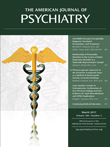T
o the E
ditor: Hyperhidrosis, or excessive sweating, can be an uncomfortable and embarrassing side effect of antidepressants. It is estimated to occur in 14% of patients taking tricyclic antidepressants (
1). The presumed mechanism of tricyclic antidepressant-induced sweating is the inhibited reuptake of norepinephrine, leading to the stimulation of peripheral adrenergic receptors (
2).
Sweat glands are innervated by peripheral sympathetic nerves, which are mediated by acetylcholine. Oxybutynin, an anticholinergic drug that is registered for urge incontinence, has shown to be effective in the treatment of excessive sweating in some cases (
3) but has not yet been reported to be effective in cases of antidepressant-induced sweating. Here, I present two cases in which oxybutynin was successfully introduced to decrease excessive sweating.
Patient A is a 59-year-old man with a history of recurrent episodes of panic disorder, for which he had used paroxetine, venlafaxine, and escitalopram as well as high doses of oxazepam in the past. He was admitted to the hospital because of a severe depressive episode with suicidal ideation. The depression was successfully treated with clomipramine, 100 mg/day, which was effective for the treatment of panic attacks as well. Although he sweated all over his body, he was willing to continue clomipramine monotherapy after discharge. Lowering the dosage did not change the situation, nor did treatment with cognitive-behavioral therapy. Finally, a trial with oxybutynin, 2.5 mg b.i.d., relieved the hyperhidrosis completely, without any side effects.
Patient B is a 60-year-old man with recurrent severe depressive episodes with psychotic symptoms and agitation. Typical for his disorder are the rapid onset of relapse and the severity of agitation, which in the past required hospitalization and seclusion. In the latest episode he was treated with clomipramine, 75 mg/day, and olanzapine, 15 mg/day, but he suffered from severe hyperhidrosis. A switch from olanzapine to haloperidol did not change the hyperhidrosis. Later, 800 mg/day of lithium was successfully added for the treatment of his depressive symptoms. Oxybutynin, 5 mg t.i.d., was added to his treatment and relieved his hyperhidrosis without side effects.
There are several preferential strategies to treat hyperhidrosis, such as lowering the dosage or altering the dosing schedule, changing clothing or food habits, or regulating anxiety (
2). In the present two cases, these strategies were unsuccessful and oxybutynin maintenance treatment was introduced. With its rapid, short-term effect (within an hour), oxybutynin could also be considered “as needed” in specific social situations. One should be careful in dosing to avoid anticholinergic side effects such as constipation, urinary retention, and blurred vision. Although placebo-controlled research is necessary, the cases reported here suggest that adding oxybutynin to antidepressants can be a simple and effective treatment option for hyperhidrosis.

